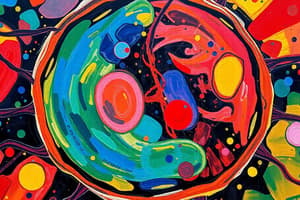Podcast
Questions and Answers
What is the primary function of mitochondria in eukaryotic cells?
What is the primary function of mitochondria in eukaryotic cells?
Mitochondria are responsible for producing energy in the form of ATP through cellular respiration.
How do mitochondria contribute to cellular metabolism?
How do mitochondria contribute to cellular metabolism?
Mitochondria play a crucial role in cellular metabolism by breaking down glucose and other nutrients to generate ATP.
What unique feature do mitochondria have regarding their DNA?
What unique feature do mitochondria have regarding their DNA?
Mitochondria have their own circular DNA, which is similar to bacterial DNA.
In addition to energy production, what other roles do mitochondria serve in the cell?
In addition to energy production, what other roles do mitochondria serve in the cell?
What effect do mitochondria have on aging and disease?
What effect do mitochondria have on aging and disease?
Flashcards are hidden until you start studying
Study Notes
Mitochondria: The Powerhouse of the Cell
- Primary Function: Mitochondria are the primary sites of cellular respiration, the process that converts nutrients into usable energy in the form of ATP (adenosine triphosphate).
- Cellular Metabolism: Mitochondria play a crucial role in cellular metabolism by:
- Oxidative phosphorylation: Producing ATP through the electron transport chain and chemiosmosis.
- Metabolic intermediates: Providing intermediates for other metabolic pathways, such as the Krebs cycle and fatty acid oxidation.
- Unique DNA: Mitochondria possess their own DNA, distinct from the nuclear DNA found in the cell's nucleus. This mitochondrial DNA (mtDNA) is circular and encodes for specific proteins involved in mitochondrial function.
- Beyond Energy Production: Mitochondria are multifaceted organelles with additional roles:
- Calcium signaling: Regulate calcium ion concentration within the cell, essential for various cellular processes.
- Apoptosis: Participate in programmed cell death through the release of cytochrome c.
- Reactive oxygen species (ROS) production: Generate ROS as byproducts of respiration, which can act as signaling molecules or contribute to oxidative stress.
- Aging and Disease: Mitochondria are linked to aging and various diseases:
- Accumulation of mtDNA mutations: Over time, mtDNA can accumulate mutations, leading to impaired mitochondrial function and contributing to age-related decline.
- Mitochondrial dysfunction: Dysfunctional mitochondria are implicated in several diseases, including neurodegenerative disorders, cardiovascular diseases, and cancer.
- Oxidative stress: Excessive ROS production from mitochondria can damage cellular components, contributing to various diseases.
Studying That Suits You
Use AI to generate personalized quizzes and flashcards to suit your learning preferences.




